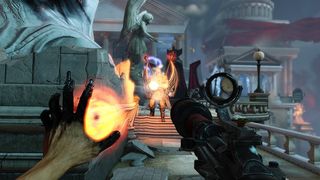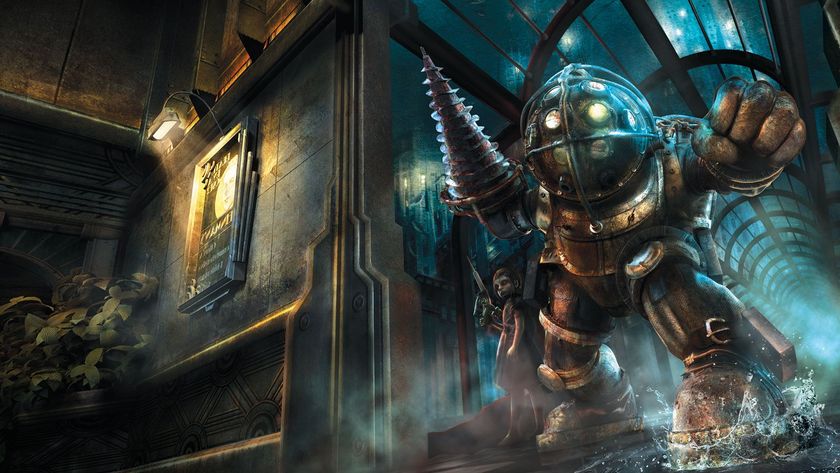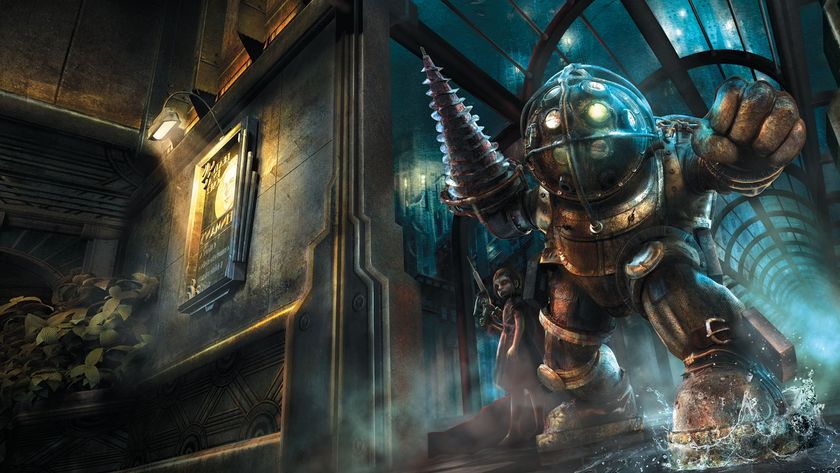12DOVE Verdict
Pros
- +
Elizabeth feels like a real person
- +
One of the most visually captivating games ever made
- +
How the game lives up to or defies your expectations in equal measure
Cons
- -
NPCs can feel hollow compared to Elizabeth
- -
The fact that it ends
- -
How racist people were in 1912
Why you can trust 12DOVE
Companionship. It’s one of the strongest emotions you can feel in any work of fiction. Your connection with an imaginary character seems real, born organically through a shared experience and the challenges you overcame at each other’s side. It’s the presence of companionship that elevates BioShock Infinite from being a great game to an astounding one, imbuing the exhilarating FPS gameplay with a sense of genuine humanity. Elizabeth is your only friend in the airborne city of Columbia, a twisted vision of a utopia floating in the heavens. And seeing the sights in an unfamiliar city is always more fun with a friend.
The year is 1912. You're Booker DeWitt, an ex-Pinkerton agent with the machismo of Harrison Ford, sent to extract a woman from the dizzying heights of Columbia’s aerial metropolis. As with the previous BioShock games, this fantasy environment is stunning to behold and layered with an incredible ambience. The simple act of walking its cobbled streets and browsing through gift shops turns into a mesmerizing experience, where propaganda posters, eavesdropped conversations, and children’s toys all give you a glimpse into this society’s warped sense of patriotism. Columbia feels like an inhabited world, and your curiosity into its inner workings will be rewarded--and built up--at every turn.
You’ll also find yourself in awe as you explore Columbia. The city is downright beautiful, with striking colors and brightness in some vistas and an ominous duskiness in others. Going from a cheerful, vibrant street fair into less congenial settings (like a church of raven-worshipping cultists who idolize Abraham Lincoln's assassin, John Wilkes Booth) is surprising in all the right ways, and no two environments feel alike. The pacing of the level design is excellent, never dawdling on any one set piece for too long but giving you just enough time to appreciate their magnificence.
Blended into these gorgeous locations are messages of repugnant bigotry, and the stark contrast between the idyllic cityscape and the prejudice that pervades it tells a story all by itself. Racist caricatures aren’t used for cheap shock value--they help sell the idea that most citizens in Columbia think that skin color dictates status. But Infinite’s narrative stretches far beyond a mere face-off between the forces serving the self-righteous Father Comstock and the freedom fighters of the zealous Vox Populi. The 15-to-18-hour campaign doesn’t limit itself to the ideas of right and wrong, or force you to make dichotomous moral choices; instead, it’s the kind of tale that subverts your expectations time and time again.

Central to this story is Elizabeth, your strong-willed, super-powered ally who dreams of escaping her life in captivity. Through a combination of affecting voicework, convincing facial animations, and brilliant AI, Elizabeth feels like a completely autonomous companion--a friend. Her body language delivers emotion without words; a glimmering smile at Booker when he makes promises, an averted gaze and crossed arms if he breaks them. Elizabeth’s behavior makes you forget she’s a video game character: She’ll explore environments all on her own, humming to herself or beckoning you over to point out something you might’ve missed. When patiently waiting for you to finish surveying a room, her gaze will shift to sights beyond the player, rather than fixating on your head like so many video game NPCs. Once you’ve grown accustomed to Elizabeth’s mannerisms, the vacant stares and limited reactions from lesser characters can make them feel lifeless by comparison--though no worse than any other great game.
Her incorporation into the FPS gameplay is downright ingenious. Too often, companions become a detriment in combat, in constant need of baby-sitting or instructions. But Elizabeth is the polar opposite, able to fend for herself and assist you with her supernatural abilities. You’ll be grateful when she opens inter-dimensional tears in the environment, altering the layout of a level to give you cover or create an enemy-attracting diversion. When you die, it’s Elizabeth who worriedly revives you. It makes the bond between you and Elizabeth feel that much stronger--when she’s happy, you’re happy. When she’s hurt, you’ll want to personally slaughter whoever it was that hurt her.

Elizabeth’s presence also brings the tone firmly into action territory and away from survival horror. Knowing that you won’t have to face your enemies alone will make you feel empowered--quite the switch from the original BioShock’s desolate, chilling atmosphere. Elizabeth is a reliably helpful partner, seeking out the items you need and tossing them to you just in the knick of time during an intense firefight. Her companionship acts as a lifeline instead of a liability, and effortlessly generates thrilling moments during battle.
Picture this: you’re nearing the bottom of a machine gun clip, heart pounding as swarms of Comstock’s goons charge at you. Then you hear Elizabeth shout your name, spin around to catch the ammo she’s thrown, quickly reload, and blast your assailants in the face with hot lead. These moments will overwhelm your adrenal glands, and feel like incidental heroics instead of manufactured, scripted events.
Speaking of adrenal glands, Infinite’s combat will be satisfyingly familiar for BioShock veterans. The gun-in-one-hand, magic-powers-in-the-other formula delivers exciting shootouts one after another, and lets you play to your strengths and approach enemies however you see fit. In place of Plasmids are some imaginative Vigors, which open up even more avenues for combo-based traps, and the gunplay offers a satisfying range of close-quarters firepower and long-range artillery.

But sky-lines, the suspended tracks you can use to ride through levels like a rollercoaster, turn the first-person shooting into a first-person thrillride. It delivers a new FPS experience entirely, where you hold your breath at the apex of a sky-line before screaming down the rail so fast that no bullet can touch you. You won’t have access to sky-line mobility in the lion’s share of the fights--but when you do, it’s an absolute rush.
Incredibly, BioShock Infinite delivers on your years’ worth of expectations, then exceeds them. Regardless of your affinity for the FPS genre, Infinite deserves your attention, and it’s the kind of landmark experience that happens only a few times in a gaming generation. Even after the game is over, Elizabeth--and Columbia--will stay with you.

Massive, beautiful, revolutionary--BioShock Infinite is a remarkable adventure that'll keep you hooked from start to finish... and then from start to finish again.
This game was reviewed on PC.
More info
| Genre | Shooter |
| Description | Take to the skies for the third installment of the BioShock franchise. |
| Franchise name | BioShock |
| UK franchise name | BioShock |
| Platform | "PS3","Xbox 360","PC" |
| US censor rating | "Mature","Mature","Mature" |
| UK censor rating | "Rating Pending","Rating Pending","Rating Pending" |
| Alternative names | "Bioshock 3" |
| Release date | 1 January 1970 (US), 1 January 1970 (UK) |
Lucas Sullivan is the former US Managing Editor of 12DOVE. Lucas spent seven years working for GR, starting as an Associate Editor in 2012 before climbing the ranks. He left us in 2019 to pursue a career path on the other side of the fence, joining 2K Games as a Global Content Manager. Lucas doesn't get to write about games like Borderlands and Mafia anymore, but he does get to help make and market them.

BioShock Infinite “may not have been the thing I wanted, but that doesn’t necessarily mean it wasn’t the thing the audience wanted”: Ken Levine guides us through his entire gameography

Former BioShock director Ken Levine spoke about Alec Baldwin and Emma Stone for roles in the sci-fi series, but he's unsure gamers really care about Hollywood actors













